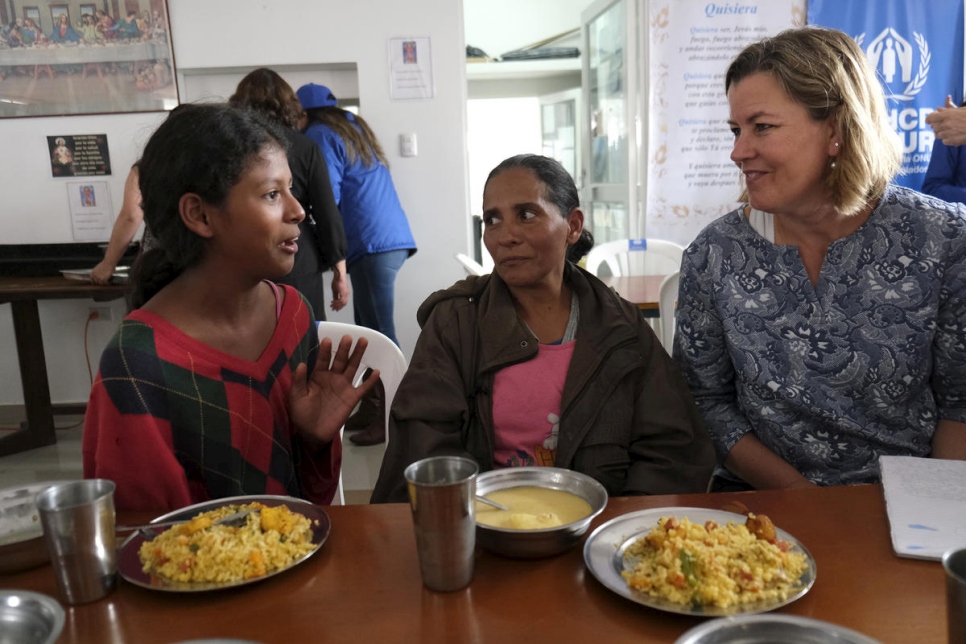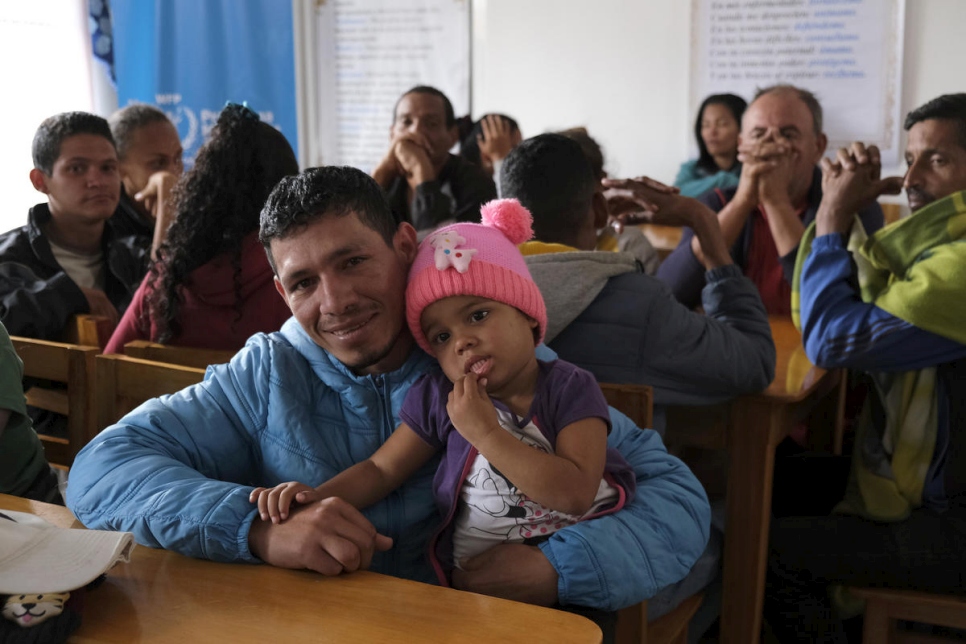Support for Venezuelans 'needed more than ever,' says Deputy High Commissioner
Kelly Clements visits Ecuador and Colombia to assess urgent needs amid a deeply underfunded regional response.

Twelve-year-old Hipsiamar and her mother talk with the UN Deputy High Commissioner for Refugees, Kelly T. Clements, at Divino Niño community kitchen in Tulcan, Ecuador. © UNHCR/Santiago Escobar-Jaramillo
As the number of refugees and migrants from Venezuela tops 4 million, UN Deputy High Commissioner for Refugees Kelly Clements made an impassioned appeal for more support for countries in Latin America and the Caribbean hosting those in need of international protection.
“Protection is needed now more than ever,” said Clements. “Colombians and Ecuadorians are opening up their homes and their communities and they deserve our support. Stronger engagement by the international community is essential.”
During a weeklong visit to Ecuador and Colombia, Clements heard stories of desperation, fear, violence. She spoke with broken families who left everything behind – their home country, their possessions, their lives and dreams – in order to reach safety.
The Deputy High Commissioner visited the region to survey opportunities to support countries hosting Venezuelans in line with a humanitarian response plan that is only 21 per cent funded.
"Stronger engagement by the international community is essential.”
Clements started her visit in Ecuador, a country with a long tradition of welcoming people on the move, including large numbers of Colombian and Venezuelan refugees.
More than a million Venezuelans have arrived in Ecuador since 2018. Some are staying in the country – more than 260,000, according to immigration authorities – while others continue further south in search of safety and better opportunities.
In Rumichaca, the main border point between Colombia and Ecuador, Clements spoke with some of the 1,650 Venezuelans who cross on average every day. Among them were families who had been walking for days and weeks, many lacking documents and a clear plan of what to do next.
One woman she spoke with at a UNHCR assistance point near the border was coping with a medical condition characterized by low levels of white blood cells. Jeymi described walking for a week alone through Colombia looking for safety.

José Gregorio Ron, 28, and his daughter Greymal eat a free meal at the Divino Niño community kitchen in Tulcan, Ecuador. © UNHCR/Santiago Escobar-Jaramillo
“I want to live a bit longer,” she recounted to Clements. “I had no access to adequate food and needed medicines in Venezuela. I hope to be able to go through the medical tests I need in Ecuador.”
At a community kitchen in Tulcan, which provides 200 warm meals daily to the most vulnerable Venezuelans who have just arrived in the country, Clements witnessed the level of needs first-hand.
“It is the first warm meal we have had in the past 24 hours,” said 12-year-old Hipsiamar, a Venezuelan girl who had just arrived in Ecuador with her family and their black kitten. They had walked for 30 days across Colombia, spending most nights outdoors.
Clements also had the chance to meet with Ecuadorian local and national authorities, notably Vice-President Otto Sonnenholzner. She praised the government and people of Ecuador for responding to the needs of Venezuelans. She also lauded the country’s role in harmonizing the regional response through diplomatic efforts such as the Quito Process.
Clements also highlighted the importance of ensuring that people who have been forced to flee “continue to have access to international protection” and that they are able to obtain temporary residence permits or other visas to ensure safety.
Eneida, a laboratory technician, shared her experience with Clements. After reporting the theft of medicines back in Venezuela, she became a target. “I was part of a local committee where I was in charge of verifying the delivery of medicines,” she explained. “The threats began when I discovered that medicines were being sold and misused.”
“It is important to enhance livelihood opportunities to ensure they can restart a life in dignity."
Today, Eneida makes a living by taking care of a house owned by an Ecuadorian family. She is grateful for the country’s hospitality.
“Finding a job related to their field is always hard for displaced professionals like Eneida,” said Clements. “It is important to enhance livelihood opportunities to ensure they can restart a life in dignity and prevent risks of exploitation and abuse.”
After Ecuador, Clements travelled to Colombia’s border with Venezuela. Together with UNHCR Special Envoy Angelina Jolie, she visited La Guajira, one of the poorest regions in Colombia, where an estimated 150,000 Venezuelan refugees and migrants are being hosted by local communities.
- See also: UNHCR Special Envoy Angelina Jolie calls for leadership and humanity as millions flee Venezuela
In Riohacha, Clements spent time at a shelter for children who had been sexually abused or trafficked, a danger many Venezuelan refugee women and children face when they cross the border irregularly. The centre’s director described the overwhelming influx of Venezuelans, and the risks faced by the vulnerable among them, as an atom bomb in impact.
Clements and Jolie met with Colombia’s President Iván Duque and visited UNHCR’s Integrated Response Centre in the border town of Maicao, currently hosting 350 highly vulnerable Venezuelans. Beyond shelter and food, the centre offers legal assistance, activities for children, medical assessments and psychosocial support.
The centre opened in March, but plans to expand its capacity have stalled due to a funding shortfall that has slowed the humanitarian response throughout the entire region.
